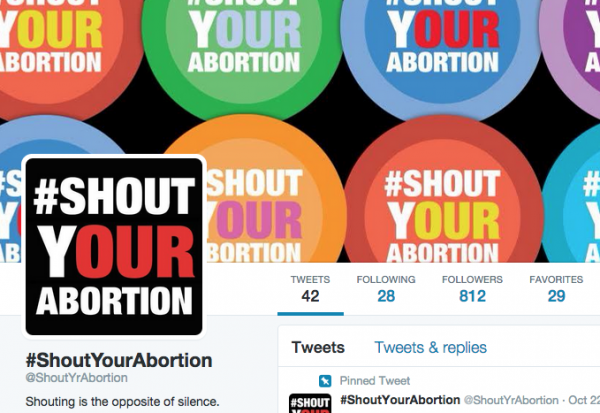
In the ongoing battles around whether to defund Planned Parenthood, Lindy West and Amelia Bonow created the Twitter hashtag #ShoutYourAbortion to encourage women to share their abortion stories, express their experiences, and recognize the stigma that often silences women who have an abortion. Consequently, many have criticized the hashtag and attacked the women involved. Supporters of #ShoutYourAbortion argue that sharing real women’s stories on social media produces cultural change around an issue surrounded by legal rhetoric. Sociological research details why women have generally felt compelled to stay silent about having abortions and the potential benefits of speaking up.
Many women believe that disclosing their abortion experiences will lead to negative responses from relatives and friends, due to widely held norms of femininity and motherhood that assert women are “natural nurturers” and the idea that having an abortion negates those qualities. In a classic study of pro-life and pro-choice activists, Kristin Luker notes that abortion is often seen as a “referendum on the place and meaning of motherhood.” For pro-life activists, terminating a pregnancy may be the ultimate example of being a “bad mother.” Rather than face anticipated judgment and condemnation around moral codes of appropriate feminine behavior, women then choose to conceal their procedures.
- Kristin Luker. 1984. Abortion and the Politics of Motherhood. Los Angeles: University of California Press.
- Paula Abrams. 2015. “The Bad Mother: Stigma, Abortion, and Surrogacy.” Journal of Law, Medicine, and Ethics 43(2):179-191.
A major source of stress and frustration women experience centers on the gendered imbalance of responsibility for contraception and abortion decisions. Research finds that women are often expected be responsible for providing or taking contraception, but are heavily criticized when they take responsibility by choosing to have an abortion. Thus, Sally Brown argues, where women are held responsible for reproductive decisions, “decision making, if ‘decisions’ happen at all, is bound up with notions of hegemonic masculine and feminine roles.”
- Sally Brown. 2015. “‘They Think it’s All Up to the Girls’: Gender, Risk, and Responsibility for Contraception.” Culture, Health, & Sexuality 17(3): 312-325.
- Katrina Kimport, Kira Foster, and Tracy A. Weitz. 2011. “Social Sources of Women’s Emotional Difficulty After Abortion: Lessons from Women’s Abortion Narratives.” Perspectives on Sexual and Reproductive Health 43(2):103–109.
Stigma, however, does not reduce the likelihood that a woman will have an abortion. Cockrill and Nack write that even women who “believe abortion is morally wrong and that women who have abortions are careless and irresponsible will still have abortions.” Instead, the primary consequences of abortion stigma are decreased mental and physical health, strained relationships, and loss of social status. Spaces of affirmation and support like the #ShoutYourAbortion campaign allow women to engage in “collective stigma management,” offering a supportive network where their public presence can work to change social attitudes and shatter the silence surrounding abortion experiences.
- Kate Cockrill and Adina Nack. 2013. “‘I’m Not That Type of Person’: Managing the Stigma of Having an Abortion.” Deviant Behavior 34(12): 973-990.
- Gretchen Sisson and Katrina Kimport. 2014. “Telling Stories about Abortion: Abortion-Related Plots in American Film and Television, 1916–2013.” Contraception 89(5): 413-418.

Comments